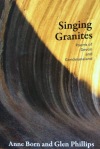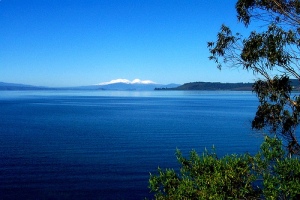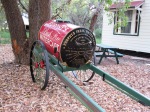Three years ago, I was on my way to New Zealand where I was booked to do nine poetry readings, when the visit had to be aborted because of an accident. So I was very pleased to have another chance to go Down Under this winter, and as we were taking a holiday in French Polynesia (see previous blog) and visiting a number of relatives, I decided that one reading in New Zealand and one in Australia would be enough this time.
In New Zealand we stayed with my sister-in-law, Sarah, in Taupo and swam in the lake each day, enjoying the crystal clear waters – and especially the fact that the temperature of the water was 27 C. I also enjoyed the fact that although the weather was blazing hot, snow could be seen on the tops of the mountains at the other end of the lake, so the first thing I did each morning was to stand at the window and check that the mountain tops were still white.
Lake Taupo is the largest lake in New Zealand, initially formed during a huge volcanic eruption over 25,000 years ago. A further massive eruption some time between 180 and 232 AD ejected so much material that it seems possible that it was responsible for the red sky that appeared over Rome and China in the time of Pliny.
A New Zealand poet, Geni Johnson, had kindly invited me to read to Taupo’s Literary & Poetry Society, Live Poets, at a restaurant in town.  There was a good audience, including a couple of people who happened to have flown in from the British Council in Shanghai (not specially to hear me, I hasten to add). A few open mike slots gave me the opportunity to hear some local poets, and they were all very appreciative of my reading.
There was a good audience, including a couple of people who happened to have flown in from the British Council in Shanghai (not specially to hear me, I hasten to add). A few open mike slots gave me the opportunity to hear some local poets, and they were all very appreciative of my reading.
Moving on to Australia, thanks to Oversteps poet Glen Phillips, I received a  wonderful welcome in Perth. Glen was the joint author with my predecessor, Anne Born, of ‘Singing Granites: Poems of Devon and Gondwanaland‘, which was the second book I published after I took over as Managing Editor of Oversteps Books
wonderful welcome in Perth. Glen was the joint author with my predecessor, Anne Born, of ‘Singing Granites: Poems of Devon and Gondwanaland‘, which was the second book I published after I took over as Managing Editor of Oversteps Books
Because of other commitments, much activity had to be packed into just one day. In the morning Glen took me to visit his research department, ‘Landscape and Literature’, at the Edith Cowan University campus at Mt Lawley. Here I met and talked to a PhD student and learned something of the work being done there.
Glen then transported me to the CTV Perth radio studio for a half-hour interview conducted by Peter Jeffery. The quality of an interview is always dependent on the skill and professionalism of the interviewer, and Peter was fantastic, putting me entirely at ease and covering a great deal in the half-hour without making me feel rushed.
 I had been invited to give a reading in the evening to the Fellowship of Australian Writers and Western Australian Poetry Inc. The meeting was to take place in the Writers’ Centre which is located in Joseph Furphy’s house. I was driven slightly out of the city to what appeared to be a deserted wood, where there was one other car parked. I approached the house down a leafy footpath with some trepidation, thinking it was a long way to travel for a tiny audience; but I was delighted, and astonished, when we opened the door, to find the room heaving with people, with not a spare seat to be seen. I have no idea where they had all come from, or where they had parked their cars, but they gave me a wonderful welcome.
I had been invited to give a reading in the evening to the Fellowship of Australian Writers and Western Australian Poetry Inc. The meeting was to take place in the Writers’ Centre which is located in Joseph Furphy’s house. I was driven slightly out of the city to what appeared to be a deserted wood, where there was one other car parked. I approached the house down a leafy footpath with some trepidation, thinking it was a long way to travel for a tiny audience; but I was delighted, and astonished, when we opened the door, to find the room heaving with people, with not a spare seat to be seen. I have no idea where they had all come from, or where they had parked their cars, but they gave me a wonderful welcome.
This furphy, or water carrier, stands outside the house. It was made in the nineteenth century by J Furphy & Sons, and used to transport water to animals, and also to douse bush fires – though I think this amount of water would stand little chance against the horrific bush fires that have raged over Australia recently. People tended to congregate around the water carts and chat, rather as employees do around water fountains today, which is probably why the word ‘furphy’ is used by Australians to describe an unreliable rumour. John Furphy was the brother of the Australian writer Joseph Furphy, who wrote under the pseudonym Tom Collins, and his house is preserved as a Writers’ Centre.
Not surprisingly, this distinguished audience was highly receptive and appreciative, and at the end they not only gave me a fee, but also bought all the books I had with me, which lightened my luggage for the return journey considerably. I was pleased, in the course of the evening, to include a mini-launch of Glen Phillips’ latest collection, ‘Land Whisperings’, which comprised poems he had written as part of his PhD thesis and also includes some of the poems he wrote for Singing Granites.

With me in this picture are Oversteps poet Professor Glen Phillips and Dr Trisha Kotai-Ewers, both of whom are former Presidents of FAWWA.
So I have good evidence that poetry is alive and well in the Antipodes. At the end of this busy, happy and interesting day I received pressing invitations to return to Perth for longer, which I’m sure I shall do at some stage in the future.
Comments closed






